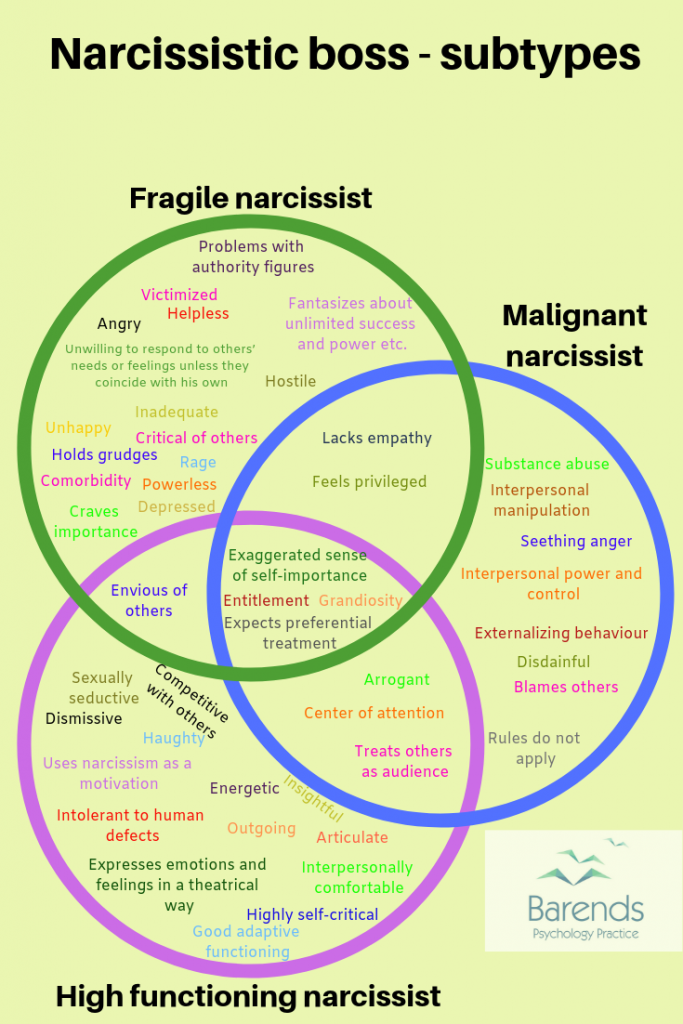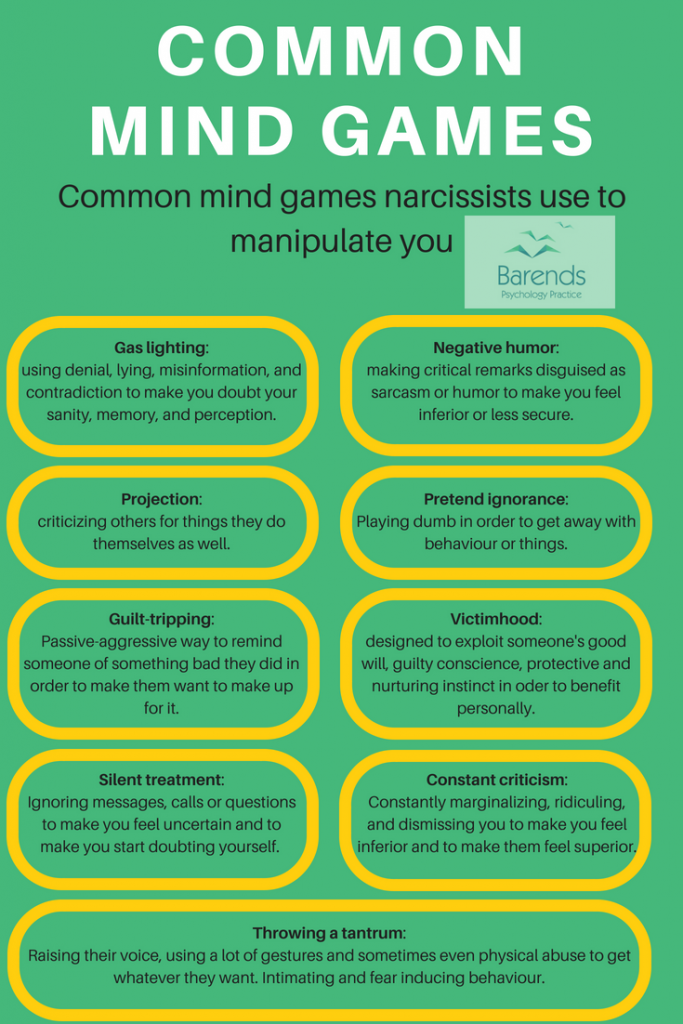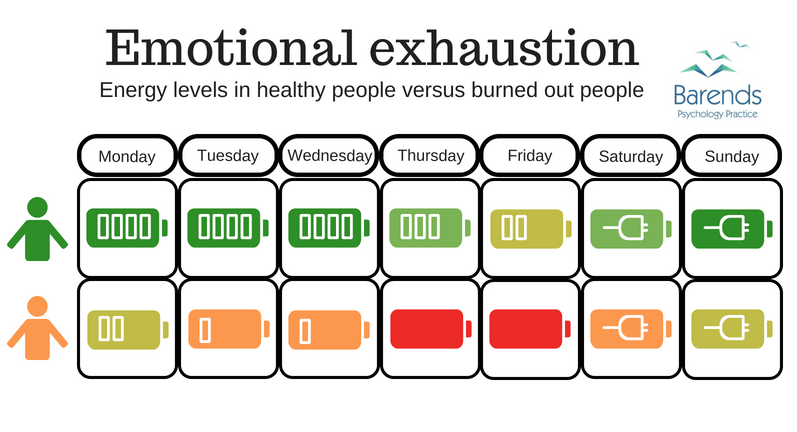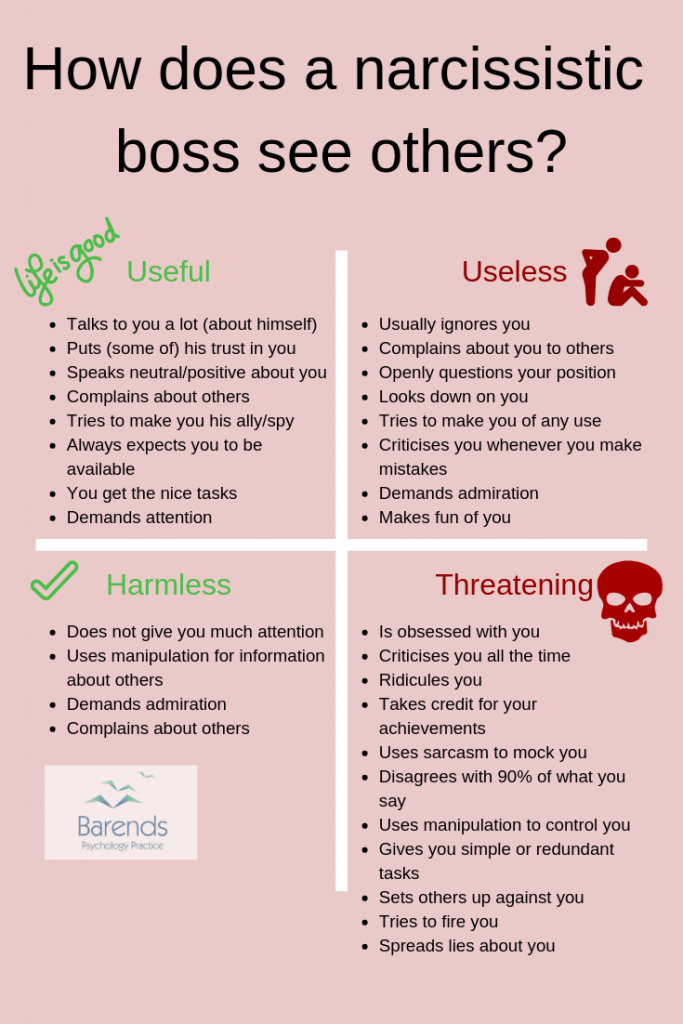Having a narcissistic boss
Dealing with a narcissistic boss can be tricky, frustrating, confusing, and even dangerous. Their impulsiveness, tantrums, self-centeredness, and lack of self-reflection often have a profound impact on their company or department, creating a tense, hostile, and sometimes unsafe working environment. These behaviors can lead to significant consequences: companies may face fines for ignoring regulations or even go bankrupt due to impulsive and risky decisions. Employees, in turn, may develop complex post-traumatic stress disorder (C-PTSD) as a result of exposure to threats, manipulation, unpredictable behavior, and frequent outbursts. Fortunately, not all narcissistic bosses are the same. Researchers identify three main types: the malignant narcissist, the vulnerable narcissist, and the exhibitionistic (or high-functioning) narcissist. Each type comes with distinct strengths and weaknesses, which we’ll explore below. In this article, we’ll cover: • How to recognize a narcissistic boss • The impact they can have on a company or department • The effects they can have on employees (friend versus foe dynamics) • Strategies for coping with a narcissistic boss • Ways employees can protect themselves
Go to:
At Barends Psychology Practice, treatment is being offered for victims of narcissists. Go to contact us to schedule a first, free session.
How to recognize a narcissistic boss
Before diving into the characteristics of narcissistic bosses, we must acknowledge that certain narcissistic traits can benefit a company and even protect employees. For example, high-functioning narcissistic bosses often display achievement-oriented behavior, energy, interpersonal comfort, high motivation, and good adaptive functioning [1]. They may support and be friendly toward employees if it helps achieve company goals—unlike malignant or fragile narcissists, who exhibit more destructive patterns.
However, some traits can have both positive and negative effects. For instance, a fragile narcissist’s tendency to be highly critical and envious of others might push both themselves and their employees to perform better. On the other hand, these traits can create a hostile and stressful work environment. In other words, having a narcissistic boss doesn’t always result in abuse, terror, and suffering. That said, narcissistic bosses also exhibit a range of negative traits. While some are universal across all narcissistic types—such as arrogance and entitlement—others are specific to certain subtypes or situations. For example, fragile narcissists often feel powerless or self-critical, while malignant narcissists rarely allow such vulnerabilities to surface.
The diagram (shown above or to the right) illustrates behaviors, feelings, and attitudes unique to each narcissistic subtype. The green circle represents fragile narcissists, the purple circle represents high-functioning narcissists, and the blue circle represents malignant narcissists. Shared traits between subtypes appear where circles overlap, highlighting the nuanced differences in how these traits manifest.
It’s important to remember that certain behaviors, attitudes, or feelings associated with one subtype may occasionally appear in others, depending on the situation. For example, while “blaming others” is characteristic of malignant narcissists as a manipulation technique, fragile narcissists may also display this behavior as a defense mechanism when their feelings of inadequacy are triggered.(Advertisement. For more information about narcissistic bosses, continue reading).
Below is an overview of the behaviors, feelings, and attitudes specific to each narcissistic subtype, as identified by researchers [1]:
- Exaggerated sense of self-importance
- Entitlement
- Grandiosity
- Expects preferential treatment
- Lacks empathy
- Feels Privileged
- Arrogant
- Center of attention
- Treats others as audience
- Substance abuse
- Interpersonal manipulation
- Seething anger
- Interpersonal power and control
- Externalizing behaviour
- Disdainful
- Blames others
- Rules do not apply
- Exaggerated sense of self-importance
- Entitlement
- Grandiosity
- Expects preferential treatment
- Lacks empathy
- Feels Privileged
- Envious of others
- Craves importance
- Depressed
- Powerless
- Angry
- Hostile
- Comorbidity
- Rage
- Holds grudges
- Critical of others
- Unhappy
- Inadequate
- Victimized
- Helpless
- Problems with authority figures
- Fantasizes about endless power and success
- Unwilling to respond to others’ needs or feelings unless they coincide with their own
- Exaggerated sense of self-importance
- Entitlement
- Grandiosity
- Expects preferential treatment
- Arrogant
- Center of attention
- Treats others as audience
- Envious of others
- Sexually seductive
- Competitive with others
- Haughty
- Dismissive
- Uses narcissism as a motivation
- Energetic
- Insightful
- Articulate
- Outgoing
- Intolerant to human defects
- Interpersonally comfortable
- Highly self-critical
- Expresses emotions and feelings in a theatrical way
- Good adaptive functioning
Narcissistic boss – high functioning narcissist
Based on the lists above, the high-functioning narcissistic boss clearly displays the most positive and the least negative behaviors, feelings, and traits. They tend to have stable work histories and are less likely to develop other mental disorders, such as depression or social anxiety [1]. However, recognizing them can be more challenging due to their sometimes contradictory behaviors. Typically, their narcissistic tendencies become more pronounced in stressful situations, feelings of rejection or being ignored, disappointment in themselves or others, or envy toward others. In these scenarios, they may display dismissiveness, haughtiness, self-criticism, or overly dramatic emotional outbursts. High-functioning narcissists prefer being the center of attention and struggle to tolerate others receiving it. For instance, if an employee garners more attention during a meeting, lunch, or event, the high-functioning narcissist may downplay the employee’s achievements, use sarcasm disguised as criticism, or even feign illness or injury to regain focus.
Narcissistic boss – fragile narcissist
The fragile narcissist combines feelings of inadequacy, victimization, helplessness, and powerlessness with jealousy toward others. To manage these negative emotions, they develop a sense of entitlement, feel privileged, and exaggerate their self-importance. When employees fail to show the respect the fragile narcissist believes they deserve, the narcissist may lash out, hold grudges, or even become hostile. This type is extremely sensitive to rejection, and even minor perceived slights are remembered. Feelings of revenge often linger, leading them to bully or mistreat those they believe rejected them. Fragile narcissists commonly use techniques such as gaslighting, splitting, inducing guilt, and humiliation. Talented employees, often seen as threats, typically bear the brunt of these behaviors. These employees may be held back, overloaded with simple or excessive tasks, humiliated for mistakes, and denied well-deserved praise or promotions. Paradoxically, when the fragile narcissist needs these employees, they may temporarily acknowledge their talents and treat them with respect.
Narcissistic boss – malignant narcissist
The malignant narcissist is driven by a desire for power, control, and attention and will stop at nothing to achieve their goals. Manipulation, threats, and blame-shifting mark their behavior. At their core, malignant narcissists are deeply insecure, using their narcissism as a shield to avoid confronting these insecurities. They constantly inflate their egos by insulting, humiliating, and blaming others, as well as bragging about achievements—many of which they may exaggerate or fabricate. Unlike fragile narcissists, malignant narcissists do not react sensitively to criticism. They tend to dismiss it, label it as false or irrelevant, or retaliate aggressively. Their primary coping mechanisms for criticism include avoidance and denial. By attacking critics, they deflect attention away from themselves and maintain control of the narrative. Like high-functioning narcissists, malignant narcissists demand to be the center of attention. However, unlike the high-functioning or fragile narcissist, they rarely feel envy toward others receiving attention. Instead, they believe they are inherently entitled to all the attention and will throw tantrums or create chaos to reclaim it if necessary.
Narcissistic boss – impact on company/department
The narcissistic boss has two faces when it comes to their impact on the company or department. On one hand, they can boost production, increase sales, and secure much better contracts or business deals than others without narcissistic personality disorder. As long as the company is growing, they are happy and satisfied. On the other hand, sooner or later, their arrogance will become their downfall. When the narcissistic boss begins to fall, they will cause as much damage as possible to others.
Many narcissistic bosses experience temporary success due to their arrogance, stubbornness, lack of empathy, and manipulation techniques. They view the department or company as their own, identifying with it much like a mother identifies with her child. In the beginning, they work hard and expect the same from their employees. The narcissistic boss takes credit for growing numbers, increases in sales, and even for the personal successes of their employees. During these periods, the narcissist can appear generous, sharing their success with others and even offering raises to employees. Their negative narcissistic behaviors typically flare up only when they feel threatened—when they’re not receiving enough attention, praise, respect, or power, or when they’re losing control. Fortunately, during these periods, the positive behaviors are more apparent: the high-functioning narcissist motivates the team, the fragile narcissist is friendly and comfortable at work, and the malignant narcissist enjoys talking about themselves.
Transition:
Success boosts the narcissist’s confidence, which isn’t a problem as long as they’re successful. However, when they experience a setback, things slowly begin to unravel. This setback could come in many forms: a denied promotion, a rejected product, a missed deal, losing a large sum of money, or simply failing to increase sales.
All the narcissistic boss wants is control, power, and attention. The arrogance, exaggerated sense of self-importance, and entitlement they feel get projected onto the company or department. This leads them to take greater risks, disrespect other departments or companies, and behave as if they’re more important than they are. Unfortunately, this risky and arrogant behavior won’t result in more control or power.
Downfall:
Losing control, power, or not getting the attention they crave is a narcissist’s worst nightmare. Anything that negatively affects these aspects triggers a response. The longer it takes for them to regain their lost power, attention, or control, the more impulsive, risky, and disrespectful their behavior becomes. The typical negative narcissistic traits, behaviors, and feelings surface, while the positive ones vanish. At this point, they need to find someone to blame—whether it’s another department, a company, or an employee. Temper tantrums, rage, hostility, and haughty behavior are to be expected.
Depending on the type of company, their responsibility, and the amount of influence they have on people above them, this downfall can unfold slowly or quickly. Eventually, they will distance themselves from their work and “give up.” At this point, they will focus only on personal gain, abusing their power by throwing expensive parties, spending company money on themselves, disrespecting laws and etiquette, and causing even more harm to the company. If they face the possibility of being fired or sent home on sick leave, they may turn unpredictable, rage-filled, and even suicidal. After all, being fired or sent home signifies humiliation, loss of control, power, and attention. In these situations, it’s important to stay neutral. By staying neutral, you prevent them from blaming you and might even gain their trust as an ally. However, if you turn against them, they will most likely seek revenge.
Narcissistic boss – impact on employee
Narcissists do not have friends. They view people in terms of ‘useful’ versus ‘useless’ and ‘threatening’ versus ‘harmless.’ The narcissistic boss craves power, attention, and control, and anyone who can help achieve these goals is deemed useful. A harmless person is someone they don’t need to worry about but may find useful in the future. A threatening person is anyone who denies or takes away the narcissistic boss’s power, control, or attention. It’s possible that a very useful employee may suddenly become a threat to the narcissist, leading to hostility and mobbing (see image for manipulation and bullying techniques). Likewise, someone considered a threat might suddenly become very useful. These unpredictable shifts make it difficult for employees to predict how their boss will respond to them or others. Their unpredictability causes a lot of stress and pressure. Every product or task must be perfect, and even if something is flawless, the boss may still demand it be done differently. They may also ask employees to make changes or adjustments during weekends or evenings. Narcissistic bosses absolutely do not respect personal boundaries or privacy. It’s not uncommon for them to ask employees to run errands, like picking up a suit, grocery shopping, or even walking their dog. Another stress-inducing aspect of working for a narcissistic boss is their ever-changing mood. One moment they’re happy, and the next moment, they throw a temper tantrum. Remember: the possibility of losing control, attention, or power will provoke a negative reaction in any narcissist. Let’s examine other negative impacts narcissistic bosses can have on their employees:Post-traumatic stress disorder (PTSD)
A narcissistic boss can trigger PTSD in employees. If an experience significantly impacts someone, it can cause sleeping problems, flashbacks, mood swings, stress, concentration difficulties, and even lead to substance abuse as a way to suppress these memories and emotions. When an employee is humiliated, criticized, threatened, or ridiculed by their boss or coworkers, they may develop PTSD. Additionally, if they are deceived or set up by their boss, they might lose trust in authority figures, someone they previously trusted. Unfortunately, narcissistic bosses frequently engage in these behaviors.
If an employee is exposed to prolonged bullying, threats, or job insecurity, they may develop Complex PTSD (C-PTSD). The negative feelings and memories related to C-PTSD and PTSD can be triggered in many ways, affecting not only job performance but also social and daily life activities [2]. For example, if a narcissistic boss often calls an employee in the evening for minor tasks, not answering the phone could cause trouble the next day. So, the employee answers and obeys, which may eventually lead to anxiety and fear of phone calls, even from people other than their boss. This is a significant stress response that can lead to sleeping problems, worrying, and even social withdrawal (‘What if my boss calls me while I’m in the cinema?’). If you recognize this and want to find out whether you have PTSD, you might consider taking an online PTSD test. You could also try reducing some PTSD triggers by visiting self-help pages for PTSD.
Burnout
Burnout occurs when employees are under constant pressure and stress for long periods, without adequate emotional and physical recovery. Common symptoms of burnout include exhaustion, concentration problems, lack of empathy, and decreased motivation, creativity, and cognitive function [3]. People experiencing burnout are also more likely to take sick leave [4]. Narcissistic bosses tend to put immense pressure on their employees, demanding positive results. Their lack of empathy, unwillingness to accept human imperfections, and difficulty with rejection (e.g., saying no) — combined with their insatiable addiction to power, control, and attention — create the perfect conditions for burnout. Narcissistic bosses will resort to manipulation, threats, bullying, or neglect to ensure that employees meet their demands. Not being able to perform or failing to prioritize work or the boss’s demands can lead to disappointment in the employee. Once the narcissistic boss is disappointed in someone, they consider the employee useless or even a threat (they may slow the boss down). In other words, not obeying the boss can lead to high stress levels and pressure, which often negatively affect family and social life. If you recognize this in yourself, consider using these self-help tips to reduce the impact burnout has on you.
Other mental disorders
Working for a narcissistic boss can also contribute to the development of other mental disorders, such as panic attacks, panic disorder, social phobia, generalized anxiety disorder, major depressive disorder, and somatic symptom disorder.
Coping with a narcissistic boss
As mentioned earlier, the narcissistic boss does not have genuine friends. Employees are viewed as either useful, useless, harmless, or threatening. These categories reflect the narcissist’s primary motivations in life: gaining power, control, and attention. Every person they interact with must serve one of these purposes. We will explore these categories, how employees can move between them, and the best ways to cope with a narcissistic boss in each scenario:
Useless employee:
If an employee cannot help the narcissistic boss gain power, control, or attention, they are seen as useless. This employee could be skilled at their job, but if the narcissist perceives that the employee isn’t willing to go the extra mile for them, they will be categorized as useless. These employees become easy targets for mobbing, threats, humiliation, and insults. The narcissistic boss will try to find a way to use the employee, but if that proves impossible, they may fire or transfer the employee at the first opportunity. 1. Work harder and try to stand out. 2. Praise your boss and support them in meetings or discussions. Thank them if you achieve something on your own. Narcissists are sensitive to this. 3. Help your boss gain more control over the company or department. 4. Contribute to making your boss more powerful, such as by increasing sales. If you can’t get out of this category: There may be several reasons: 1. Your boss is disappointed in you. If you’ve failed to meet their expectations once, it’s unlikely they’ll change their opinion soon. 2. You are not willing to make extra effort or praise them. 3. There is something about you that the narcissist dislikes (e.g., your appearance or associates). In this case, the best approach is to stay neutral during meetings and conversations. Anything you say could be used against you. Distance yourself emotionally from your job so that the narcissist’s impulsive decisions don’t affect you too much. Set healthy boundaries—narcissists will respect boundaries if there are consequences that take away their power, control, or attention.
Useful employee
An employee who helps the narcissist gain more power, control, or attention is seen as useful. Even if the employee is less productive than others, if they feed the narcissist’s need for admiration, control, or power, they will be favored. However, being in this category can be demanding. The narcissistic boss may start making excessive demands, from having to work evenings without pay to more frequent requests outside normal working hours. If the employee becomes too good at something or has too much to offer, the narcissist may become jealous and move them to the threatening category. Conversely, if the employee becomes less valuable, they could be moved to the useless or harmless category. Staying in this category is stressful and time-consuming.
An employee who helps the narcissist gain more power, control, or attention is seen as useful. Even if the employee is less productive than others, if they feed the narcissist’s need for admiration, control, or power, they will be favored. However, being in this category can be demanding. The narcissistic boss may start making excessive demands, from having to work evenings without pay to more frequent requests outside normal working hours. If the employee becomes too good at something or has too much to offer, the narcissist may become jealous and move them to the threatening category. Conversely, if the employee becomes less valuable, they could be moved to the useless or harmless category. Staying in this category is stressful and time-consuming.
How to get out of this category: Though staying in this category can be advantageous, it’s often draining. If you want to move out of this category, start by: 1. Deliberately taking more time to finish tasks, allowing yourself to recharge. 2. Not being on standby all the time, so your boss’s attention shifts to someone else. 3. Asking critical questions instead of always agreeing with your boss. 4. Gradually introducing healthy boundaries. 5. Don’t always praise or feed the narcissist’s ego—let them work for it. As long as you remain valuable to the narcissistic boss, it’s unlikely they will move you to the useless category.Harmless employee
The harmless employee does their job well, avoids complaints, and supports the boss when necessary. However, the narcissist sees this person as insignificant in terms of power, control, or influence. They are considered “below the standard” by the narcissist, and while this category is safe, employees may lack ambition or important skills. This category is the safest because the narcissistic boss doesn’t see the employee as a threat or an asset. However, the employee is unlikely to advance or be promoted. How to get out of this category: While it’s the safest category to be in, if you want to become more useful to the narcissist, follow the same advice given for those in the useless category.
Threatening employee
The threatening employee is seen as a threat by the narcissistic boss. This includes anyone who is more skilled, ambitious, attractive, intelligent, or successful in the eyes of the narcissist. Employees trying to take on important roles or positions are also viewed as threats. Employees in this category suffer the most. The narcissistic boss will insult, humiliate, or blame them whenever possible. Narcissists need an enemy, and these employees become the focus of the boss’s aggression. How to neutralize the narcissist’s behavior: • Expose the narcissist by calmly calling out their manipulative behavior. • For example: • Boss: “If even Mike understands this, it must have been very well explained.” • Employee: “Are you trying to humiliate me with that comment, Donald?” • Boss: “Well, you’re not the smartest in the room, which is an understatement.” • Employee: “Does it make you feel smarter or better when you say that?” • Repeating this strategy can make the narcissist uncomfortable and reduce their tendency to degrade you. How to get out of this category: The best way to get out of the threatening category is to work hard and remove anything that threatens the narcissist. The narcissist will ease up once you are no longer a threat. Redirect their attention to someone else, ideally another department or company, as narcissists often obsess over their enemies. Additionally, gaining control or power—such as knowledge or something the narcissist wants—can reduce the frequency and severity of criticism, potentially moving you into the useful category.
In all cases, it’s essential to recognize the shifting dynamics that occur with a narcissistic boss. Whether you’re in the useful, harmless, or threatening category, always be mindful of how your behavior and interactions may affect the narcissist’s perception of you. Each category has its risks and challenges, but by managing your responses and setting boundaries, you can navigate the environment more effectively.How to protect yourself against the narcissistic boss?
Protecting oneself against a narcissistic boss is difficult and risky. Apart from the fear of being fired, narcissists do not hesitate to use threats and scare tactics if someone opposes them. A narcissistic boss often threatens to fire someone or take away certain tasks and privileges if the employee does not promise loyalty or refuses to comply with certain demands. A typical response to these threats is to swallow it, remain silent, and obey. Opposing the boss doesn’t cross their mind—they feel powerless. However, a few actions can help.
Boss of the department
If your narcissistic boss is the head of the company, we strongly recommend looking for another job elsewhere. As long as the narcissistic boss has someone above him, there is hope. The main goal is to ensure the boss cannot falsely accuse the employee of anything and to create leverage for the employee. Here are some tips to consider:
- Communicate Almost Everything Through Email or Text: After each conversation with your boss, send him an email summarizing the conversation and ask for his confirmation. Collecting evidence is important to ensure he cannot twist facts or deny agreements, and to protect yourself from false accusations.
- Back Up Text Messages and Emails: Back up text messages and emails on two different USB drives or secure locations. This prevents them from being suddenly deleted.
- Record Conversations or Phone Calls if Necessary: Collect as much evidence as possible. Every threat works in your favor. If your boss tries to threaten you indirectly, play dumb and ask for clarification on what he means. Direct threats give you a stronger chance in court.
- Refrain from sharing private information: Narcissistic bosses often seek personal details to use against you later. For example, if you tell your boss that you’re tired, you might be excluded from a valuable project or trip. Conversely, if you mention that you’re well-rested, you could be assigned more work and criticized for not doing enough.
- Avoid Gossip and Criticism: Do not engage in gossip or criticize coworkers in front of the boss. Sooner or later, such comments may be held against you.
Standing Up to Your Boss
To stand up to your boss, you need support from others. If you’re the only one complaining, it’s your word against theirs, and your boss will likely retaliate. That’s why it’s important to gather support among other employees. Don’t expect too much at first, as many people fear losing their jobs. By questioning some of your boss’s behaviors and comments, others are more likely to notice and agree with you. But, don’t do this in front of your boss. People will begin to recognize patterns and appreciate that others share the same concerns. Do not rush into action—take it slow. Collect evidence and ensure you have support when necessary.
Setting Healthy Boundaries as a Team
Set healthy boundaries as a team. Avoid having just one leader, as the narcissistic boss will target them immediately. As a team, you grow stronger, and by rotating leadership, you make it harder for the narcissist to single out one individual. Introduce consequences for disrespecting boundaries, focusing on what your boss craves most: attention, power, and control. As a team, defend one another when the boss tries to humiliate, insult, or threaten someone. The boss will be more likely to adapt when they face resistance from the entire team. If these steps don’t lead to changes, consider approaching the higher-level boss and presenting your evidence. Again, act as a team. While this may backfire temporarily, it will only last short-term. Your boss needs a framework, and the higher-level boss can provide it.Narcissistic boss – Literature
- [1] Russ, E., Shedler, J., Bradley, R., & Westen, D. (2008). Refining the construct of narcissistic personality disorder: Diagnostic criteria and subtypes. American Journal of Psychiatry, 165, 1473-1481.
- [2] Karney, B. R., Ramchand, R., Osilla, K. C., Caldarone, L. B., & Burns, R. M. (2008). Predicting the immediate and long-term consequences of post-traumatic stress disorder, depression, and traumatic brain injury in veterans of Operation Enduring Freedom and Operation Iraqi Freedom. Invisible wounds of war, 119.
- [3] Gorter, R., Freeman, R., Hammen, S., Murtomaa, H., Blinkhorn, A., & Humphris G. (2008). Psychological stress and health in undergraduate dental students: fifth year outcomes compared with first year baseline results from five European dental schools. Eur J Dent Educ., 12, 61–68.
- [4] Schaufeli, W. B., Bakker, A. B., & Van Rhenen, W. (2009). How changes in job demands and resources predict burnout, work engagement, and sickness absenteeism. Journal of Organizational Behavior: The International Journal of Industrial, Occupational and Organizational Psychology and Behavior, 30, 893-917.






